
By the Brahmaputra (Vol: 55)
C-NES Newsletter
(For the period January– March 2022)
Help Age India Consultative
Understanding the Health and Care needs of Elderly and Community: a consultative was organized on 17 Feb. 2022 by Help Age India at the Conference Hall of the Social Welfare Department, Government of Assam. Esteemed members are requested to kindly attend and make it a learning experience with possibilities for future collaboration.The meeting was facilitated by HelpAge India represented by Dr. Ritu Rana, Head Healthcare Programmes, Paromita Thomas, Country Head (HR ), Rani Varghese, National Coordinator, M-Rite Vaccination Project, New Delhi, Sharmila Majumder, Territory Head, West Bengal & NorthEast, Kolkata and .Nilondra Tanya Programme Manager (NE). Ist of October every year is celebrated as Senior Citizens Day.
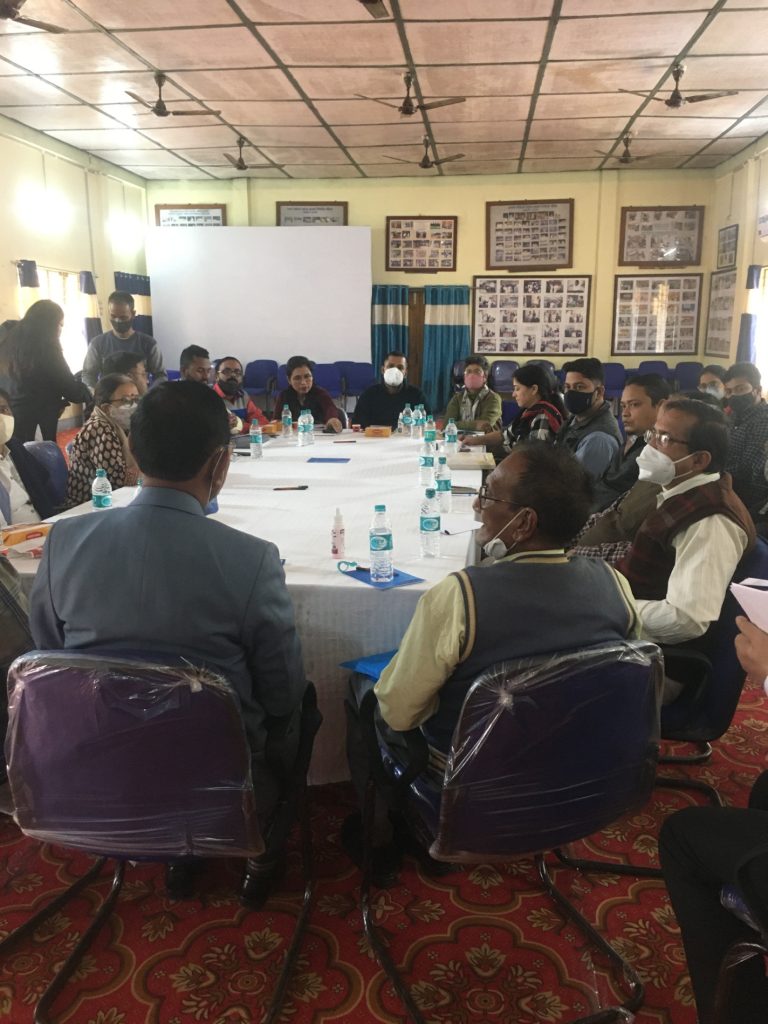
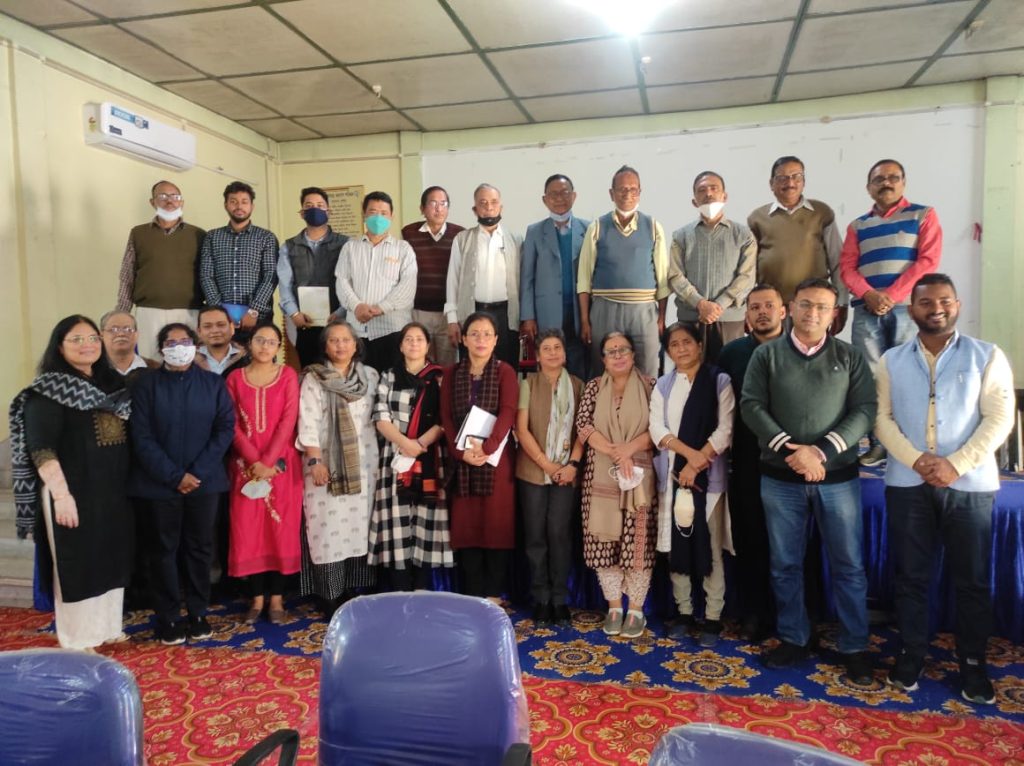
Bhaswati Goswami, Communications Officer C-NES attended the workshop and spoke about C-NES intervened areas where elderly and the disadvantaged in society have been the main focus. She sought Help Age India’s help in providing support and linkages The river island communities which see no, or very little intervention, need to be exposed to the various schemes for the elderly in society and the need to give them dignity by generating means of livelihood suited to their needs and abilities.
That the elderly need awareness on NCD, there has to be convergence of related government departments and resource and information sharing were some of the concerns shared by the participants. It was informed that in the Sonapur area on the outskirts of Guwahati, as many as 75 elderly self help groups have been formed. At Karbi Anglong district, people were taught how to form SHGs, the various govt schemes, help save money, opening bank accounts and livelihood options. Livelihood in rural areas is a big focus area of HelpAge. The need to create linkages, mapping of resources and linkages were also discussed and Help Age India could be the collaborator of groups. It was suggested that in the state PIP of the Health Department there should be provision of healthcare for the elderly and a cadre of home care providers in villages
Established in 1978, HelpAge India’s mission is “to work for the cause and care of disadvantaged older persons and to improve their quality of life. HelpAge envisions a society where elderly have the right to an active, healthy and dignified life. It is the first and only Indian organization to be honoured with the ‘UN Population Award 2020’ for its exemplary work in the field of ageing, relief efforts work during the Covid 19 pandemic and recognition of the organization’s outstanding contribution to population issues and efforts in the realization of older persons rights in India.Currently there are a projected 138 million elderly in India. HelpAge India voice their concerns so they can lead secure and dignified lives. It works through 24 state offices across India, runs numerous programs on-ground, addressing elder needs and advocating for their rights, such as their right to Universal Pension, quality Healthcare, action against Elder Abuse and many more at a national, state and societal level with Central and State governments. It advocates for elder-friendly policies and their implementation thereof. 10567 is the National Helpline Number for Elderly Help.
Workshop by SeSta
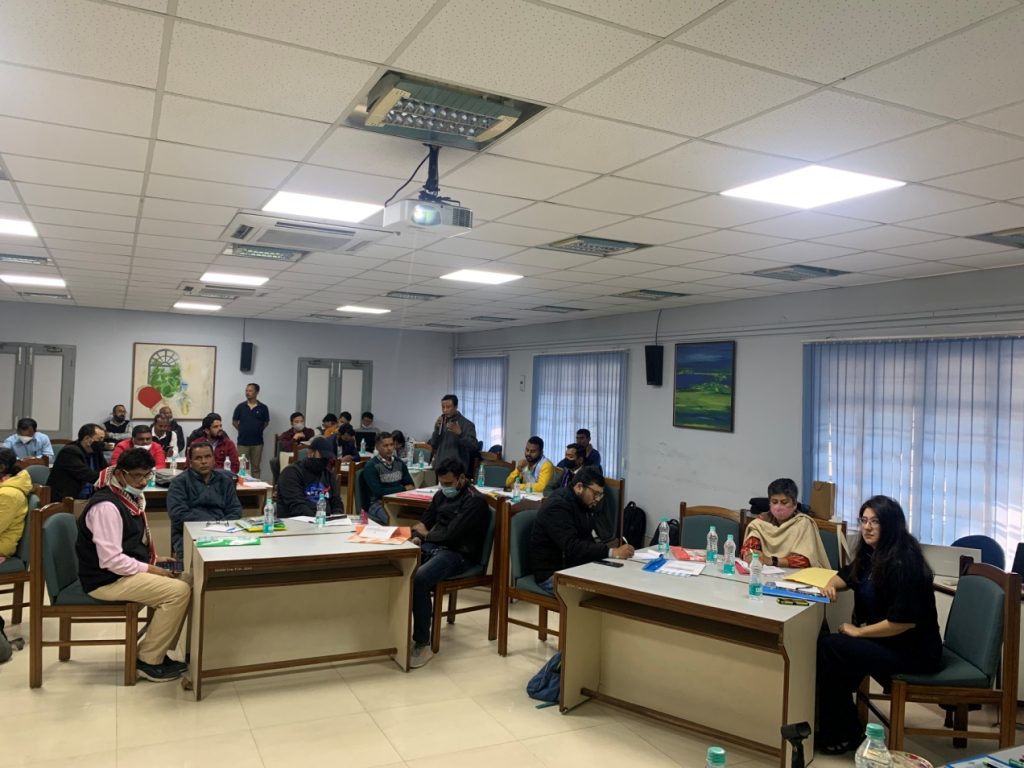
A day long workshop was organized on 18th February 2022 by the Seven Sisters Development Assistance (SeSta) on “Catalysing MGNREGS in Assam by empowering Rural Communities’ facilitation by CSOs”. The workshop, supported by Azim Premji Philanthropic Initiatives (APPI) was held at the Indian Institute of Bank Management (IIBM), Khanapara.
The key objectivesof the workshop was to :Understanding how MGNREGA is currently being implemented in India and how civil society organizations can act as catalysts in the process. Stakeholder mapping and support that can be provided for MGNREGA was another objective. Bhaswati Goswami, Communications Officer, and Nirmali Das, Research Analyst, C-NES participated at the workshop and updated the participants about the work being done in C-NES’ intervention areas and how the boat clinics have been trying to bring a holistic community development and looking beyond just the health needs of communities dwelling in the river islands.
On an introductory note, Ranjan Das, Integrator (Convergence Cell) of SeSta spoke about the need for convergence of CSOs to make a change in people’s lives. “The workshop is held to boost the momentum from our efforts as individual organizations to a situation where we together enhance our knowledge and skills through a network of CSOs which can influence the PRIs, district and state administration. As civil society organisations, all of us are trying our best to transform the lives of the poor and marginalized communities in our field areas through various interventions in their livelihoods. In the journey so far, we have experienced various challenges. Post COVID, we have observed that rural communities are in need of livelihood assets, employment and regular cash flow to contribute to the nation’s economy better after the drawbacks set due to the lockdowns. To fulfill this need, the Mahatma Gandhi Rural Employment Guarantee Act can play a crucial role with the special focus given by the state government of Assam. Over the past 2 years, SeSTA has successfully built a technical team for Convergence Cell which has been directly working at more than 20 development blocks in Assam in rural areas focusing on better implementation of MGNREGA and indirectly supporting other partner CSOs. But while we do so, we were wondering if all the organisations who are aligned with the idea can also contribute. We can also jointly pitch to donors (as some donors have shown interest) for financial support” he added.
Core objectives of Convergence Cell (Sesta)
- Address the challenges of MNREGA, facilitate communities and PRIs
- Working on synergy with CSOs on MNREGA
- Connecting beneficiaries with various govt schems
- Capacity building of communities, institutions and PRI members – how work on livelihood can be done.
Strategies
- Working on synergy with PRI and line deptt
- Support planning of schemes through integrated natural resource management(INRM) under MNREGA
- Support and engagement at every stages from family , implememtation.and monitoring level.
- Technical and capacity building support of Blocks,PRI and community during GPDP
- Create a common platformin between community, PRIs, local MLAs and govt dept
From the Field:
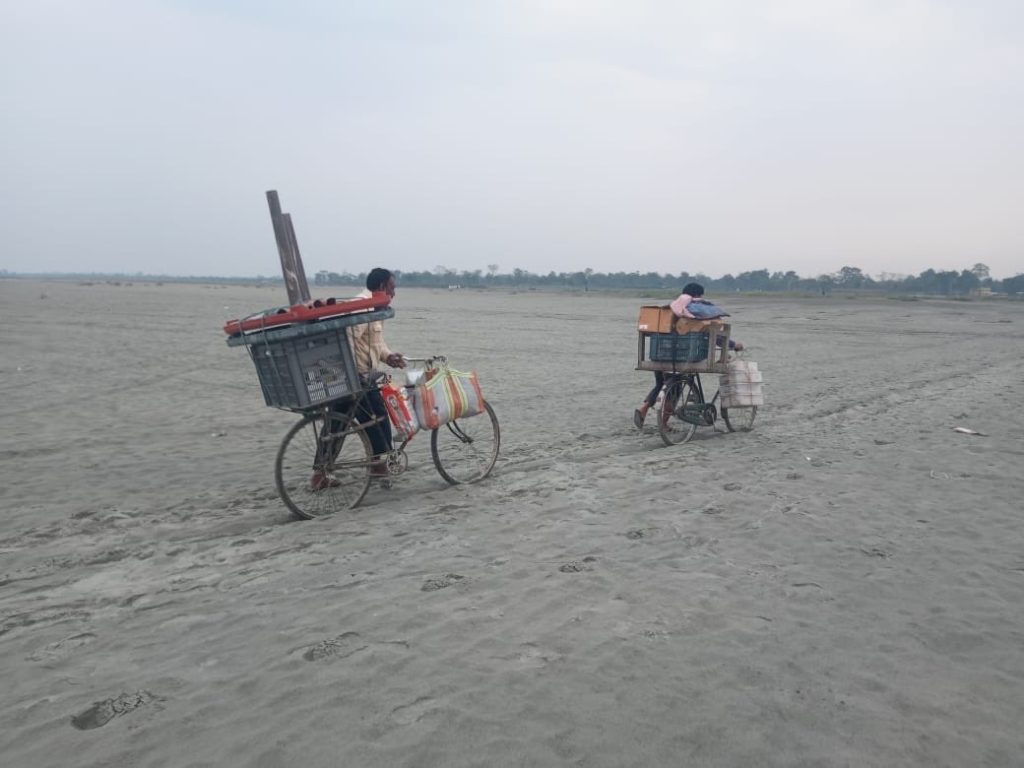
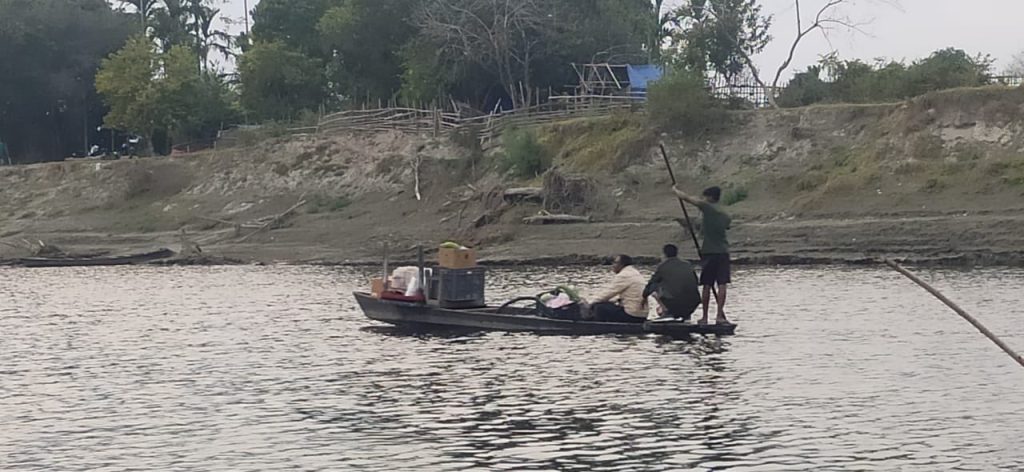
A health camp at Tinsukia district’s remote Erahoti sapori on Republic Day.26th January 2022. The kind of challenges accessing these islands require extreme dedication and resilience.
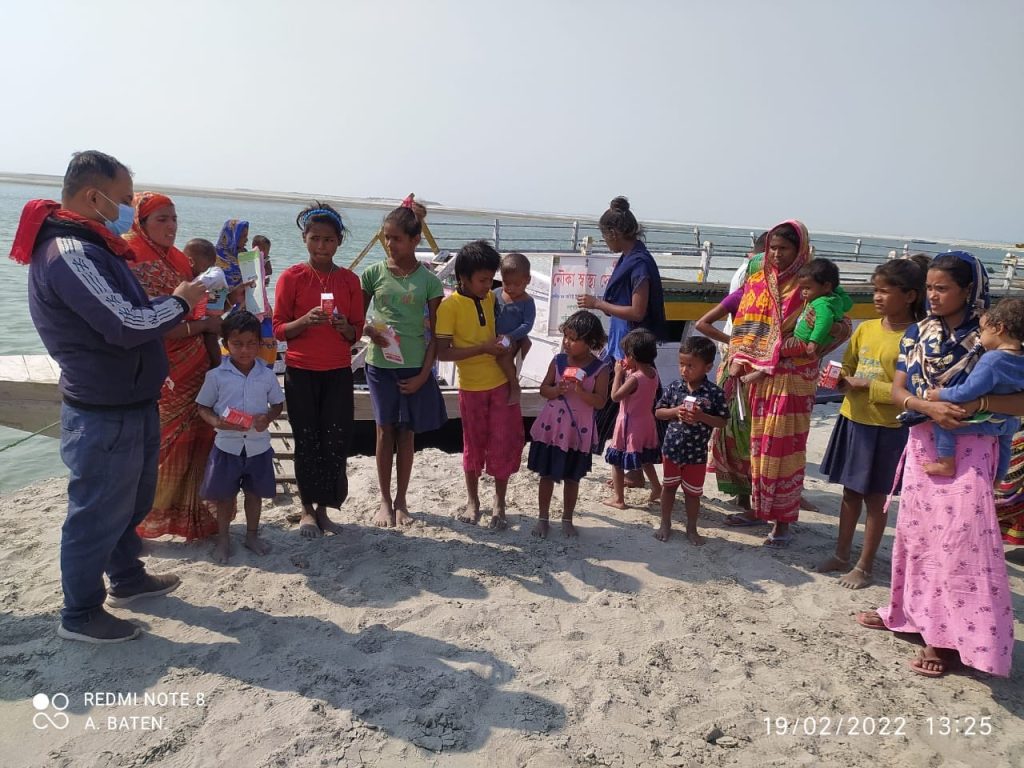
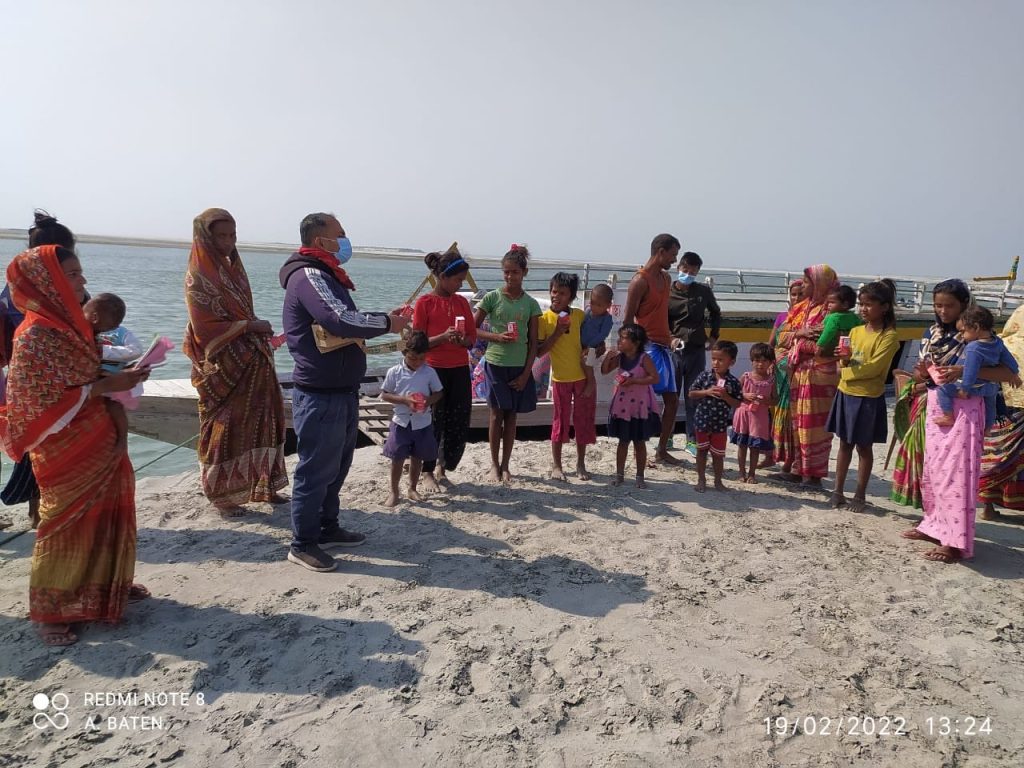
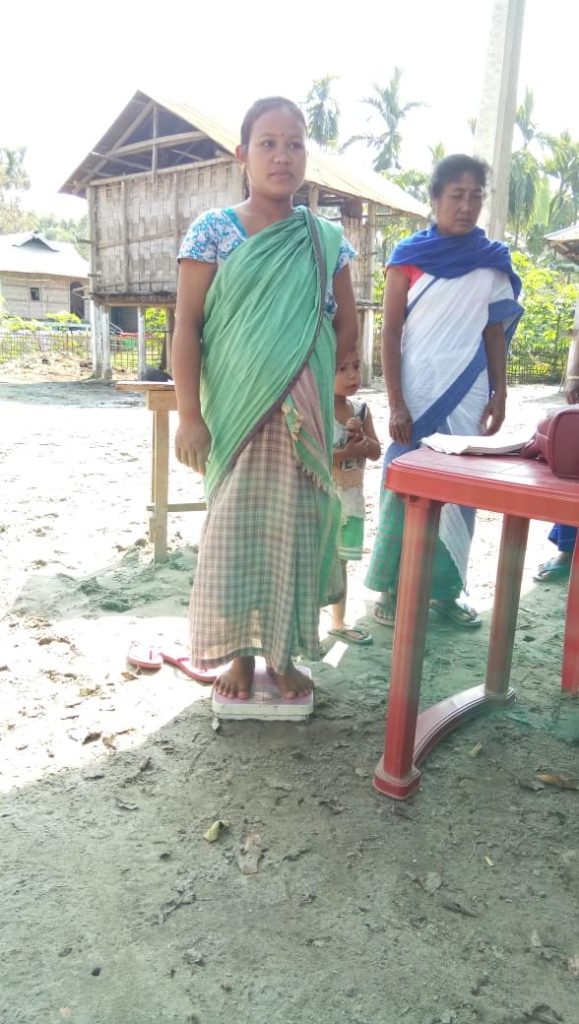
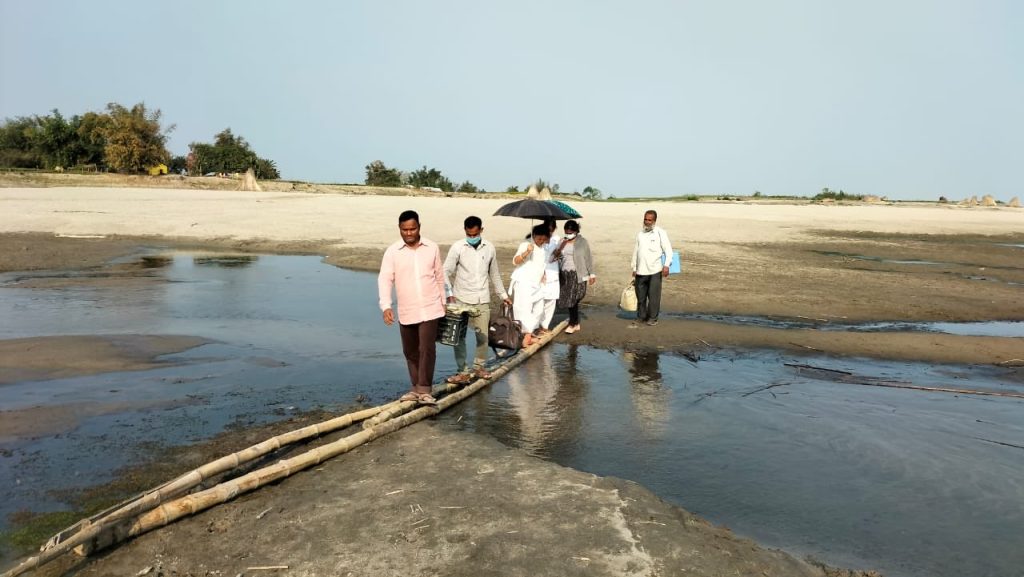
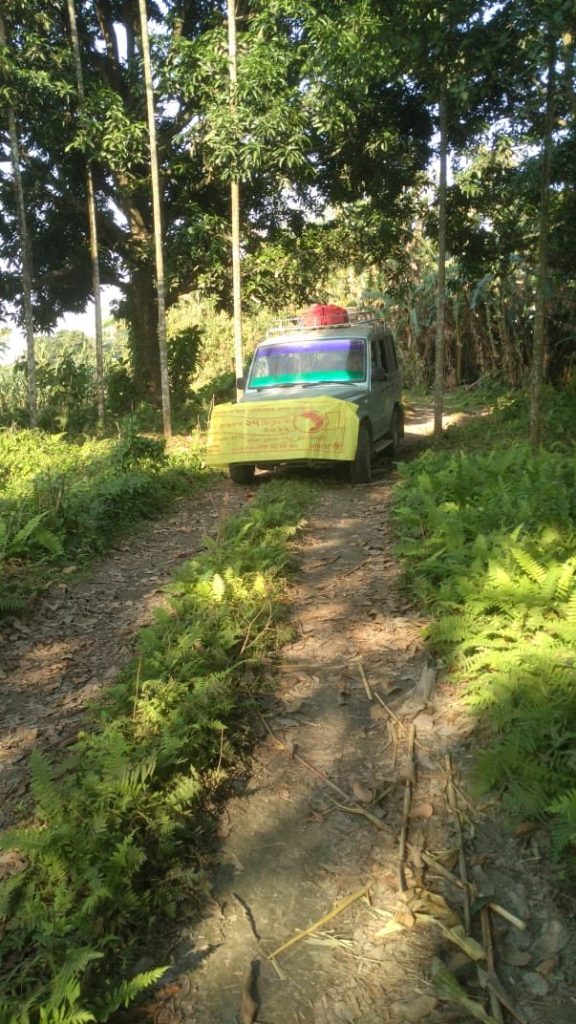
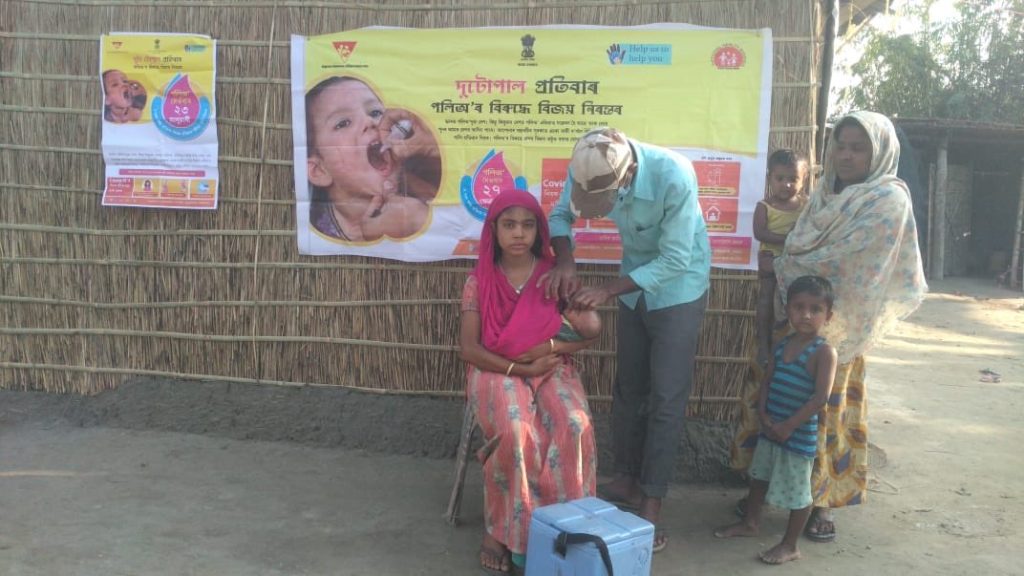
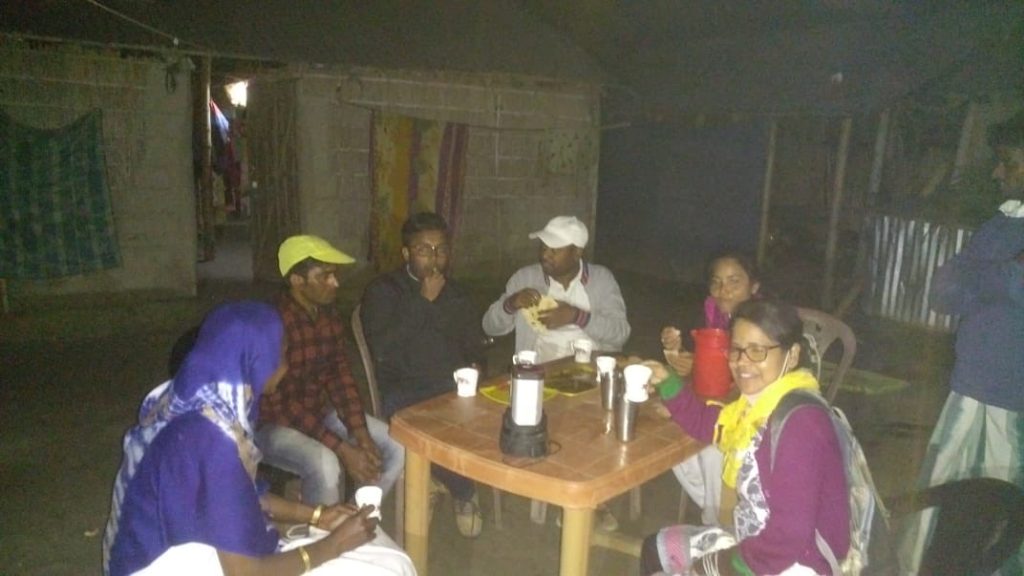
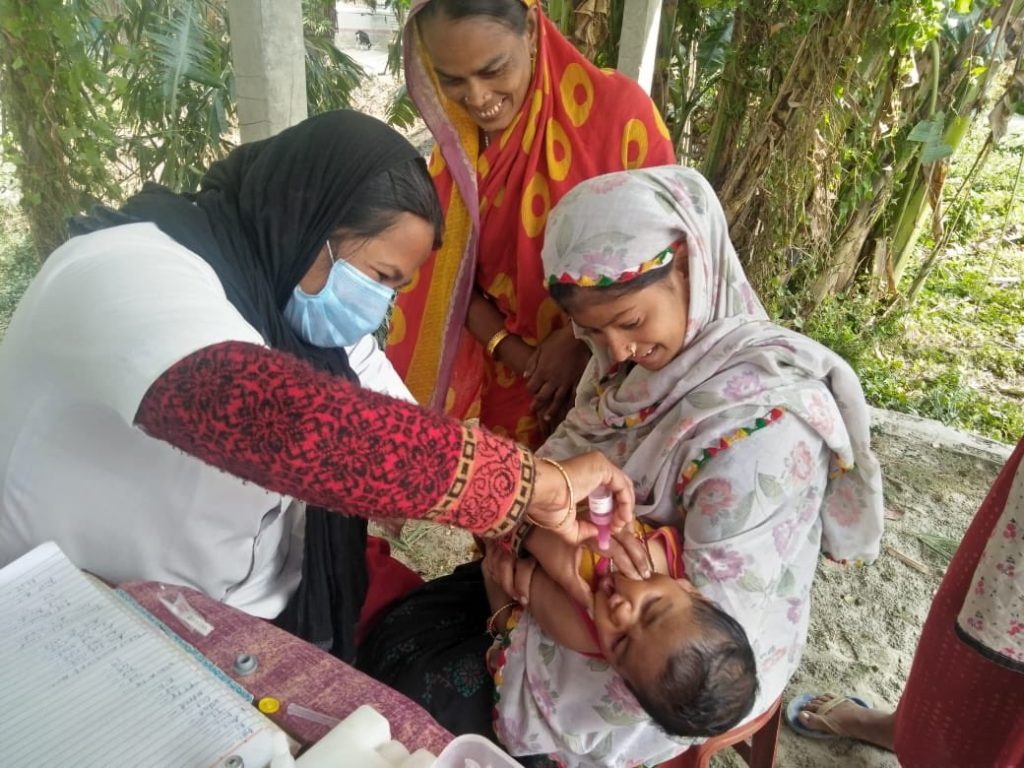
Interns from Vrije University, Amsterdam
Boat Clinics have provided opportunities for students doing research on the delivery of primary healthcare and education to the islands on the Brahmaputra. Research studies have been conducted by students from across the globe. While the interns have benefited from the unique work the organization does in the Brahmaputra valley be it in the spheres of health, education, conflicts and communications (through the Brahmaputra Community Radio Station) among others, the organization has also gained from their internship. Their work with the organization and the reports shared with C-NES has given the organization constructive feedback focusing as they do on both the positive impacts of the Boat Clinics and the organizations work as well as the gaps which need filling up, valuable suggestions for improving service delivery with a fresh perspective.
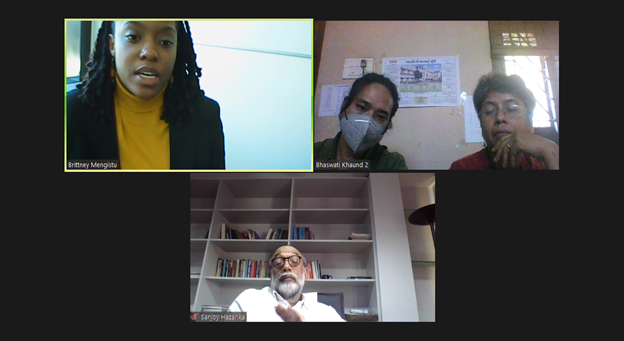
In March 2022 C-NES and the Amsterdam based Vrije University’s Athena Institute pre-master course, International Public Health have starteda collaboration. The course was created for pre-masters students with a clinical background. Over the course of 8 weeks, students will receive lectures covering broad themes in global health like nutrition, infectious diseases, mental health, sexual and reproductive health and more. The course encourages students to think critically about the health outcomes of vulnerable communities and the various factors that influence their health. The Athena Institute has its roots in VU’s Department of Biology & Society, which was established within the Faculty of Biology in 1982, following the new academic trend of linking science to society. The collaboration between C-NES’ Boat Clinics of the Brahmaputra and the Athena Institute commenced on 8 March 2022 and will end on 10 May 2022. This partnership will focus on supporting a group of four pre-master students from the Health Sciences premaster program at the university. Lindsay and Rosanne are both community nurses, Lard is a biomedical analyst and Luke is a lifestyle coach/research assistant. The students will produce, among others, a detailed report on the community needs assessment and an oral presentation. The assignment will be advised and assessed by coach Stephanie Okafor, under the supervision of Dr Brittney Mengistu from the Athena Institute. Students will also meet regularly with representatives from C-NES to provide information relevant to the course assignment. This will be the first of its kind – an online internship, in a post covid situation.
Bongaigaon in lower Assam and Majuli (Jorhat) in upper Assam, as the two districts where the internship will take place and the students will make a study on Boat Clinics and Impact on maternal health.
CareMother for C-NES Boats
CareMother, a pregnancy care company based in Mumbai, Maharashtra, provides digital solutions for high-risk pregnancy management through their device called Fetosense. The device is portable and wireless and runs for 8hrs on a single charge to perform a Non Stress Test (NST) on pregnant mothers to monitor the fetal heart rate monitoring of fetus.So far Fetosense is being used in over 300 clinics/hospitals in India and has also been placed at some Health and wellness Centre (HWCs) across districts in Assam.
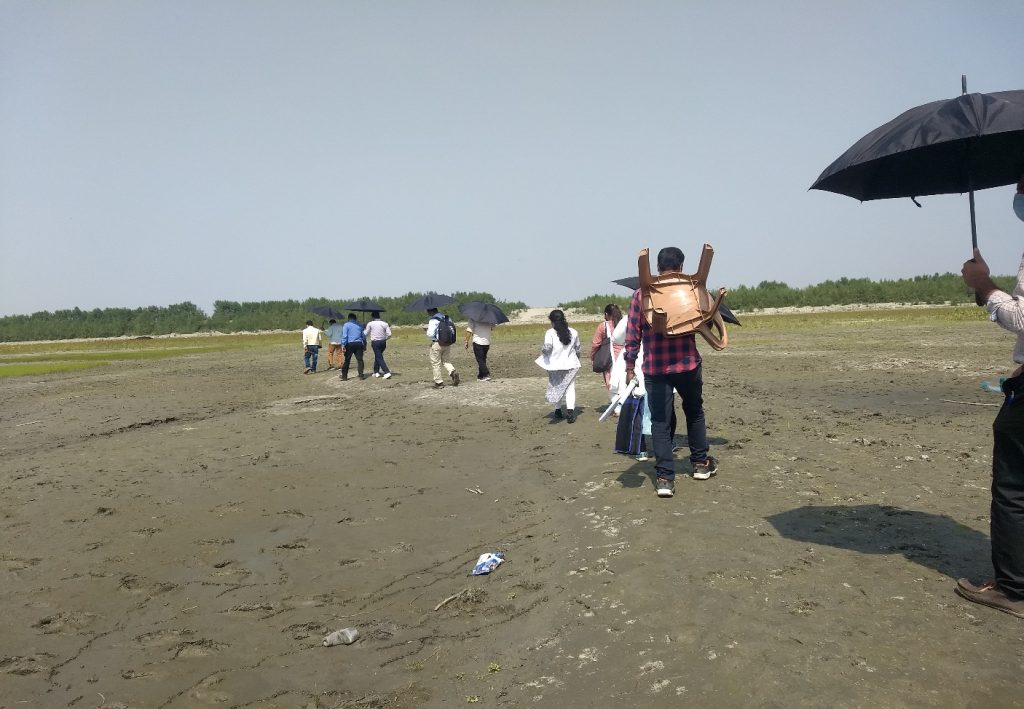


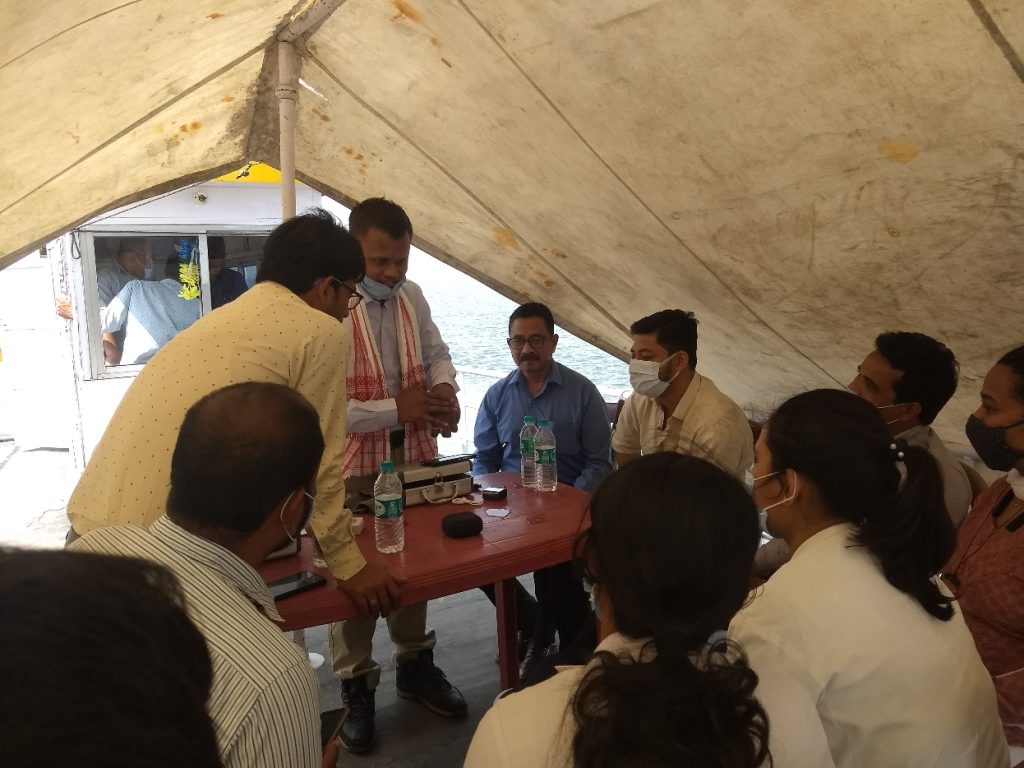
With the support of HT Parekh Foundation, CareMother provided 3 Fetosense devices to three Boat clinic (BC) unit- two mini Fetosense in Kamrup BC unit and Bongaigaon BC unit and one Fetosense device in Lahorighat Model Hospital, Morigaon which acts as a referral unit for the Morigaon BC unit beneficiaries.
On 7th March 2022, Ajay Mohanty, resource person of CareMother conducted training sessions on the use of mini Fetosesne to the BC unit staff from Bongaigaon and Kamrup district. The next day, 8th March, it was held for Lahorighat Model hospital at Morigaon attended by Dr Milan Boruah and Programme Manager Ashok Rao.
Voluntary Health Association of India (VHAI) and UNICEF project
A project,”Empowering community-based institutions for supporting Risk Communication and Community Engagement (RCCE) for COVID-19 and Routine Immunization” is being is carried out by C-NES in 4 blocks of two districts in Lower Assam for a period of six months,starting from March 2022.
The projects aims to mobilize the eligible population for the uptake of COVID-19 vaccination with special focus on increasing the second dose coverage, mobilize the teenage population (15-18 years) and the 60 plus population for COVID-19 vaccination and precautionary (booster) dose, promote COVID appropriate behaviours and support the overall routine immunization uptake while delivering COVID-19 vaccine promotion. Goalpara Urban block and Lakhipur block in Goalpara district and South Salmara Urban block and Gazarikandi block are where the project is being implemented. Preliminary activities like mapping of intervention villages, identifying of Community based organizations, and influencers have been completed.
SELCO project
C-NES and Bengaluru-based SELCO Foundation worked together on a Model Village Program (MVP) from 15th October 2019 to 31 st March 2021. The three selected remote villages – all located under Majuli district in upper Assam – were Kartik Sapori, Mekahi Sapori and Salmora. In the meetings held prior to starting the project, the communities were informed and explained about the MVP concept. Villagers expressed their happiness and assured full cooperation in successful implementation of the project. Amongst the objectives of the MVP were setting up two Smart Anganwadi Centres (AWC) at Kartik and Mekahi Saporis, installation of two solar powered sewing machines each at Kartik sapori & Mekahi sapori village, and two existing local mechanized boats of Kartik and Mekahi sapori to be upgraded with solar powered system. This would help villagers to travel on the boat during any emergency at night, transformation of nearest State Dispensary, Ownamukh to 4KW Solar Powered Model Dispensary, installation of 10 solar street lights each (15 watt) at Kartik sapori and Mekahi Sapori villages, Solar powered Pottery wheel, blunger and pugmil to be installed at Salmora village and transforming the village into a Model Pottery Village. So far 5 sewing machines have been provided and people from the community are utilizing the service. The computer centre with 3 computers is functional, and the centre has been operational so far, 27 Solar street lights were installed, with 7 street lights in 3 villages. All the street lights are functional.10 sets of Elephant repellers were also provided and are all functional. Digital tools provided at the Anganwadi centre are functional, transforming and acting as the Digital Anganwadi centre. Solar pottery machines are also functional, and women from the community are utilizing the machine. They have however been unable to provide market linkages. The khowa machine (grinding equipment) is functional but not in use due to scarcity of raw khowa(cheese ).
GNI COVID-19 Vaccine Counter-Misinformation Project
A Quint/GNI funded Covid-19 vaccine counter-misinformation project for Radio Brahmaputra(BCRS) started on June, 2021. The objective of the program being to debunk the misinformation on Covid-19 among rural masses particularly among the rural women from the vulnerable groups and promote Covid-19 vaccination among them. The project will end in May 2022 and currently in its last phase.
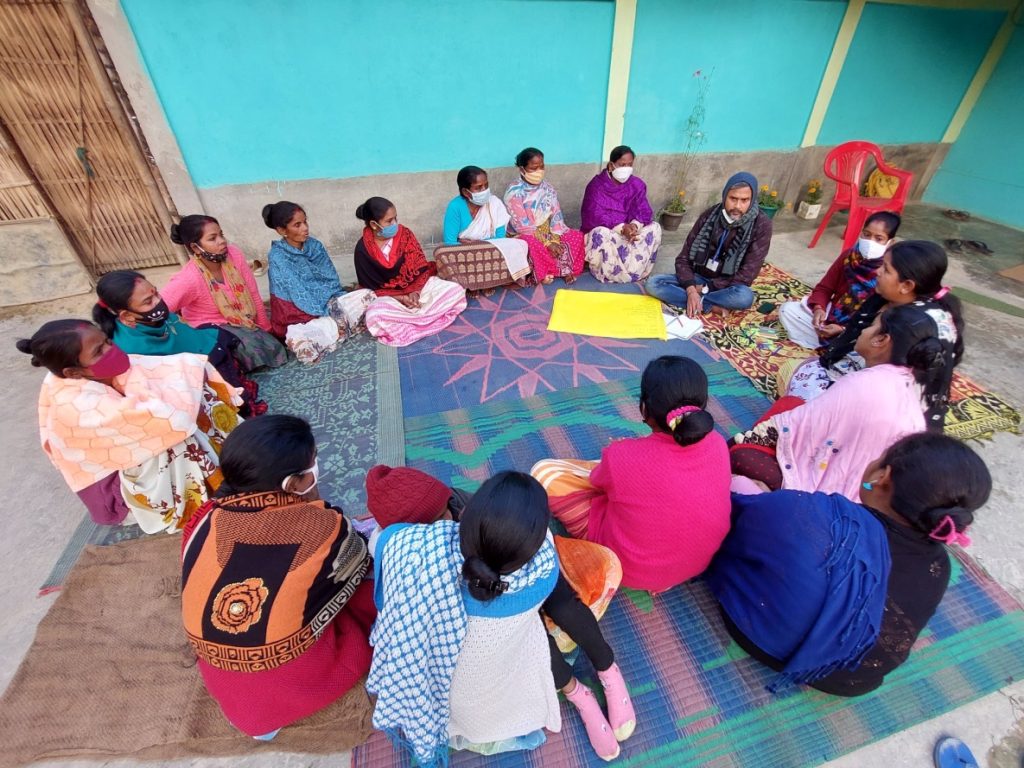
Until April 2022 BCRS has done approximately 330 radio programs from covering topics on vaccine hesitancy, CAB, importance of 2nd dose for women, adolescent, school going students and other general public in Assamese, Sadri, Mising, Hajong, Deori, Bodo & Tiwa dialects and broadcast every day 12 times of each spot.
In the radio program segments, BCRS has produced a series of radio programs in the name of “Jankiye Xakalo Jene” with the character of “Janki – a young, well-informed woman” in 5 different language and dialect. Apart from the program segment, station produce a radio feature program covering Covid-19 and vaccination namely “Katha Covid”.
The station is producing a live interactive program on Covid-19 and vaccination with doctors and subject experts from Assam medical College hospital and District Health Dept. namely “Brahmaputra Live” for rural listeners to get opportunity to talk with doctors and subject experts on said issues.